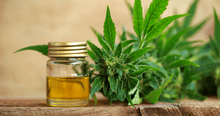
There is increasing interest in the potential of cannabidiol (CBD) for the treatment of a range of health conditions. In particular, there is excitement about its potential to treat neurological conditions, including psychiatric disorders. The two primary phytocannabinoids in the cannabis plant are tetrahydrocannabinol (THC) and CBD. THC is the component responsible for the psychoactive effects of cannabis, whereas CBD has no such effects. Preclinical and clinical studies show CBD possesses a wide range of therapeutic properties, including antipsychotic, analgesic, neuroprotective, anticonvulsant, antiemetic, antioxidant, anti-inflammatory, antiarthritic, and antineoplastic properties[1,2].
In relation to the effects of CBD on depression and anxiety, there is some support via animal studies indicating it may have antidepressant and anxiolytic effects[1,2]. It is believed that this may be via its effects on the endocannabinoid system in the brain where some studies have shown are impaired in people with psychiatric disorders. For example, there are receptors in the brain known as cannabidiol receptors 1 and 2 (CB1R & CB2R) which seem to play a role in emotions. In animal studies, deletion of CB1 can increase levels of anxiety. CBD can also affect other neurotransmitters implicated in depression and anxiety include serotonin, y-aminobutyric acid (GABA), and glutamate.
There are some preliminary, small-scale, human studies showing positive effects of CBD on anxiety, although there are no human studies conducted on people with depression. In one study, CBD was able to reduce post-stress anxiety in healthy adults exposed to a simulated public speaking task[3]. CBD also had a positive anxiolytic effect in adults with social anxiety disorder exposed to the same simulated public speaking task[4]. In another study, a single dose of CBD reduced subjective anxiety in treatment-naïve adults with generalised anxiety disorder[5]. However, in a very recently published study, it was found that dosage is important when it comes to CBD. In healthy volunteers exposed to another simulated public speaking task, pre-treatment with 300mg of CBD significantly reduced anxiety during the speech compared to a placebo. However, doses of 150mg and 600mg had no anti-anxiety effect[6]. This indicates that more is not necessarily better.
While these studies are positive, they are only very small studies and only assessed the acute effects of a single dose of CBD. Larger, well-controlled studies are required to examine the effects of CBD in people with a range of anxiety disorders (e.g., generalised anxiety disorder, post-traumatic stress disorder, social anxiety disorder, and panic disorder) and depression. It is also important to understand if CBD used over a longer period has positive anti-anxiety and anti-depressant effects. We also do not know the safety of CBD used over a long duration, although studies conducted so far do indicate that it is associated with fewer side effects than conventional medications. Given the increasing interest in CBD, I suspect that studies are on their way which will help us to understand the real ‘non-hype’ potential of CBD.